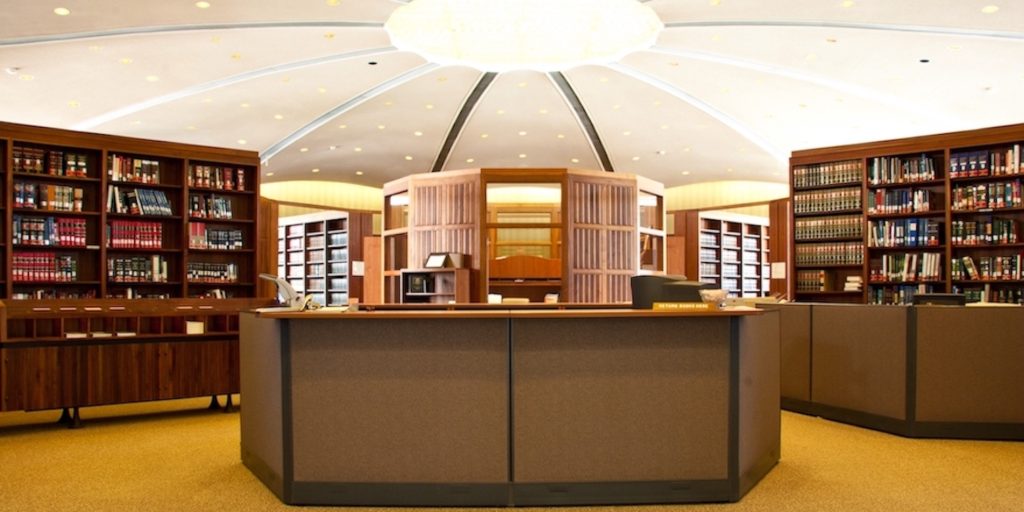- TLA provides insight on developing killer cross-examinations - August 23, 2024
- TLA program helps lawyers ‘lean into their inner wisdom’ - August 6, 2024
- New TLA president looks to build on the success of his predecessors - May 7, 2024
By Tony Poland, LegalMatters Staff • The Toronto Lawyers’ Association’s (TLA) Courthouse Library may be the “best kept legal secret” in the city but it is also arguably one of the most valuable resources available to members of the Toronto Bar, the judiciary, articling students and the public, says executive director/library director Joan Rataic-Lang.
“Access to resources equals access to justice,” Rataic-Lang tells LegalMattersCanada.ca. “Everyone is entitled to fair, equal and proper representation. We have the resources along with the knowledge and skill to ensure lawyers have the information they need to do their job to the best of their ability.”
The library’s inventory includes Westlaw Canada, Lexis Advance Quicklaw, Practical Guidance, and vLex as well as books, journals, print materials, e-books and e-journals. If there is a resource that is not in their catalogue, TLA staff can typically arrange to borrow it from another library.
Law Society of Ontario funding
Ontario’s 48 courthouse libraries receive funding from the Law Society of Ontario (LSO) through the Legal Information and Resource Network (LiRN), which governs the delivery of library services and legal information.
Recently the TLA received a grant from the LSO’s Innovation Fund, which was established to bridge the gap between the resources large law firms have and those available at courthouse law libraries, Rataic-Lang says.
She says they used the money to get a subscription to Insolvency and Restructuring Intelligence Search (IRIS) and Quicklaw’s Pleadings Motions and Facta collection (PMF).
IRIS is an AI-powered searchable database that provides insolvency practitioners with a comprehensive collection of such things as bankruptcy, receivership, and Companies’ Creditors Arrangement Act pleadings, motions, facta and Monitor’s Reports.
PMF gives users the ability to search court documents from pivotal cases since 2015 covering more than 30 practice areas. The court documents include pleadings, application records, orders, written submissions and affidavits from provincial and federal courts.
Save time and money
The TLA told members the PMF collection can help them “build stronger case strategies and gain a competitive edge by identifying actions the opposition might take.” As well, it can also save time and money by providing successful arguments as models for building cases and drafting documents.
“IRIS and PMF offer access to a collection that we didn’t have before with the actual precedential court documents,” explains library manager Megan McDonnell. “We have been working diligently to promote the library’s presence and have definitely seen an uptick in research over the last couple of years and these databases will certainly be beneficial.”
She says courthouse libraries are essential for small firms and sole practitioners who don’t have the research resources of large firms, which is why it is important to constantly evaluate and update their resources.
“Bay Street firms are always going to have cutting-edge resources,” McDonnell says. “We work hard to ensure that our collection, both digital and print, is meeting the standards and expectations of our members so they can go into court and be fully equipped knowing that they have the most up-to-date information possible.”
Constantly updating resources
She says maintaining the collection is an ongoing job.
“It is not something that you do once a year. It is a consistent task, every day, every week,” says McDonnell. “We keep an eye on what is being asked for and what is being used. Do we have things that are requested that we cannot provide? Are there new books coming out we need to have?
“It is more of a constant effort to stay on top of it and it is also reading the Ontario Reports or legal articles to see what is trending and relevant,” she adds. “We monitor what is happening in the news that may be a changing area of the law. You have to be meticulous. That is in a librarian’s DNA. We love to be meticulous.”
McDonnell says a courthouse library “has to hit almost every practice area” to serve the association’s membership.
“If you are in a large firm that specializes in one particular area, you can just buy every title that comes out. We cannot do that,” she says. “We have to pick and choose while trying to ensure that we have a comprehensive collection.”
Library team ready to help
Anyone looking for information can drop in at the library to do research at 361 University Ave. The library team is also available to do the research.
“People can always just email or call us and we are happy to help them remotely,” McDonnell says.
All research is provided free of charge to TLA members (not including fees for printing and fax services).
With a wealth of resources, some people may not know where to start when they visit the library, says Rataic-Lang.
“What I always say when we do training or any sort of introduction to the library is I am not going list all the things we can do for you because I will inevitably miss something,” she says. “Instead, just ask your question and we will show you how we can find the answer.”
The TLA offers a virtual walk-through of the library and Rataic-Lang says they offer orientation for articling students and will be adding a session for summer students.
“We have a good collection because we are larger than most courthouse libraries,” she says. “We do cover a lot of areas so let us impress you with what we can do with the resources we have.”


Pingback: TLA president looks to build on the success of those who came before him ⋆ LegalMattersCanada